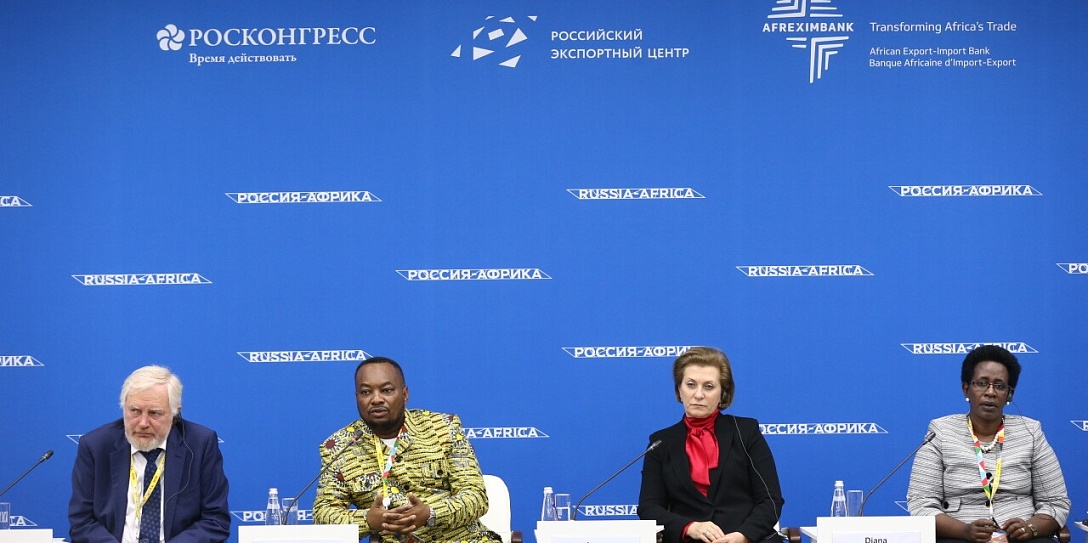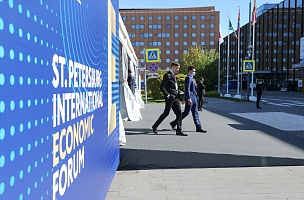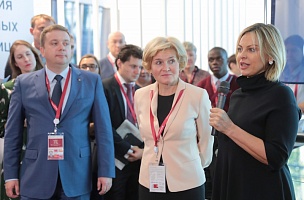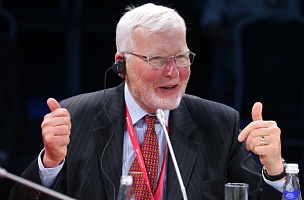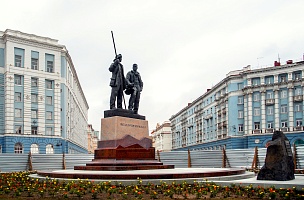KEY CONCLUSIONS
Russia
has an efficient system of epidemiological surveillance and infectious disease
prevention
«It is evident that the number of natural disasters, changes
and emergencies in Russia that has happened over the last years is leading to disruptions in the life
of various communities. In this sense, measures developed in the Russian Federation
that we take help avoid any epidemiological complications,» Anna Popova, Head,
Federal Service for Surveillance on Consumer Rights Protection and Human
Wellbeing.
«Russian Federation has a well-established and fully functioning system of
infectious disease surveillance and prevention. <...> Today’s measles situation
— pressing all over the world — calls for action. Based on the WHO requirements,
we measure measles incidence per 1 million people. That is to say, in 2018 Russia had 17 cases per
1 million people. In certain European countries it varied from 40 to 200. In such
countries as Serbia and Romania it was even higher. Updated information reveals
that this number in Ukraine exceeded 1,000. Georgia had over 700 incidents,» Anna
Popova, Head, Federal Service for Surveillance on Consumer Rights Protection
and Human Wellbeing.
Russia provided crucial help in the fight against
Ebola
«When Ebola hit Guinea in 2014–2015, Russia assisted us a lot, because it
helped us fight against the disease. <...> Processing samples, for instance. Back then, Guinea did not have a biobank, and Russia helped
us a lot. It was very important for us. We managed to collect the virus
samples. It helped us take the right measures on our level and create high-tech
laboratories with the support of the Russian government,» Abdoulaye Yéro Baldé,
Minsiter of Higher Education and Scientific Research, Republic of Guinea.
«For this work [fight against Ebola in Guinea, — Ed.] Russia provided
leading specialists and scientists. They are also practitioners. <...> During the epidemic, two major institutes were
involved: Vector, the virology centre in Novosibirsk and Microbe, the anti-plague
institute. <...> These specialists
can enter the focus of any extremely dangerous infectious disease, which is
very important. We can proudly declare these most state-of-the-art technologies
that we have just discussed and that have been developed over the years exist
within Rospotdebnadzor’s unique system. State-of-the-art technologies that ensure
biosecurity,» Vladimir Kutyrev, Director, Russian Anti-Plague Scientific
Research Institute «Microbe».
African countries are interested in cooperation with Russian specialists
«I am happy that we managed to sign a memorandum of understanding with the
Russian Government, because we wanted you to join our efforts. <...> We cooperated
with Russia in many other areas, but not in biosecurity, and our cooperation was
definitely missing that piece. Russia has an incredible experience in this area
and has done colossal research. You have so many types of vaccines, and we know
we can achieve a lot through cooperation,» Diana Atwine, Permanent Secretary,
Ministry of Health of the Republic of Uganda.
«We are happy that Russian Federation will assist us, especially when it
comes to biosecurity. We have signed a contract. Things will start with two
mobile laboratories, and we will also start vaccination. We believe that Russia’s
experience will help us strengthen the capabilities of our medical
professionals involved in biosecurity. We will also get medical professionals trained
by Russian ones that will fight this epidemic. It is not just Ebola, but other epidemics
as well,» Eteni Longondo, Minister of Health of the Democratic Republic of the
Congo.
PROBLEMS
Infectious diseases remain a threat to human life
«The principle that dominated in the 60—70s that infectious diseases are
no longer a threat as we have antibiotics and vaccines now becomes debatable and
absolutely irrelevant. Today, 40–50 years later, we see a totally different picture,
and we need to be prepared for it. Every country must be prepared for a pandemic
attack, which of course cannot be done within one country only, because today
infections do not have borders,» Anna Popova, Head, Federal Service for
Surveillance on Consumer Rights Protection and Human Wellbeing.
«Diseases related to low water quality belong to the most widespread mortality
causes. One should not forget that when it comes to pure drinking water, we cannot
address water supply without water disposal. No water disposal or waste water treatment
results in contamination of water supply sources, which creates a bigger environmental
impact and a vicious circle,» Dmitry Serov, Research Fellow, Expert on Digital
Technologies and Water Supply and Drainage Management, National Technological
Initiative Center of Excellence, Peter the Great St. Petersburg Polytechnic
University.
SOLUTIONS
More cooperation formats for fighting infectious diseases
«Multilateral efforts will not be interrupted, yet a bigger emphasis will
be put bilateral relations with respect to the experience Ms. Popova’s [Anna Popova,
Head, Federal Service for Surveillance on Consumer Rights Protection and Human
Wellbeing (Rospotrebnadzor), — Ed.] Service has, because it fits our national
interests and priorities and, of course, our partners’ interests,» Sergey
Storchak, Deputy Finance Minister of the Russian Federation.
«There is an effective executive order <...> of the Government of
the Russian Federation on providing aid to the Democratic Republic of the Congo
in 2019–2020 to fight infectious disease threats. This year, the Democratic Republic
of the Congo will get two mobile laboratories to apply our efforts in disease focus,
and we start teaching specialists of the Democratic Republic of the Congo rules
of epidemiological safety, response to epidemiological situations and working in
the disease focus. This executive order also provides for supplying the Democratic
Republic of the Congo with 50 thousand doses of measles vaccine, 10 thousand
doses of cholera vaccine and 5 thousand doses of Ebola vaccine over this time,»
Anna Popova, Head, Federal Service for Surveillance on Consumer Rights
Protection and Human Wellbeing.
Using private-public partnership mechanisms
«Together with [Rospotrebnadzor, — Ed.] we made a decision to build
a special diagnostic and treatment centre for epidemiology and microbiology, <...>
because back then Guinea did not have a specialized centre yet. It took us 50 days
to build this hospital from scratch. We did it in close cooperation with specialists
from the Ministry of Health, Rospotrebnadzor, and research institutes. <...>
We boast the best survival and recovery rates for this disease. Our performance
is twice as good as overall statistics for Africa and Guinea during the
previous pandemic. There was not a single in-hospital contraction case and not a
single medical professional contracted it,» Yakov Itskov, Director of Alumina
Business, RUSAL.
«Bureau Legint proposes to create a special fund that would aim to assist
national governments and international healthcare organizations in preventing
extremely dangerous viral diseases and fighting them. The fund’s major tasks could
include assistance in organizing research and development, as well as producing
pharmaceuticals and vaccines for prevention and effective treatment. Also, the fund
could help organize cooperation between Russian and foreign government agencies
and use their own resources, for instance, to promptly respond to outbreaks of
viral diseases, prevent their dissemination and eliminate epidemic
consequences,» Timofey Lyolikov, Executive Director, Bureau LEGINT.
Expanding the debt-for-aid financing mechanism
«We are gradually establishing cooperation in terms of such a particular
source of financing for biosecurity projects as using the outstanding debt that
we kept after a significant debt relief for a fairly large number of African
countries. <...> Debt-for-aid projects are going well with the Republic of
Madagascar. We have reached a certain progress in our work with Tanzania and
Mozambique, though there are problems there,» Sergey Storchak, Deputy Finance
Minister of the Russian Federation.
Improving vaccines and creating new ones
«In May 2019, the WHO announced a strategy to eliminate the poliomyelitis
virus that would be effective until 2023. <...> Starting from 2023, vaccination
of the world’s population is expected to be done with the use of inactivated
poliomyelitis vaccine in order to eliminate cases of vaccine-associated polio. <...>
We successfully created a joint project with the Poliomyelitis Institute so that
our plant <...> could produce inactivated poliomyelitis vaccine based on
the unique technology of Chumakov Institute,» Marina Mazurevskaya, Deputy
Director-General on Legal Issues and Government Relations, NANOLEK.


